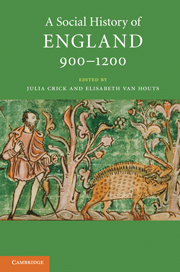Book contents
- Frontmatter
- Contents
- List of figures
- List of maps and tables
- List of contributors
- Acknowledgements
- List of abbreviations
- Map 1 England and its neighbours
- Map 2 England 900–1200
- I Introduction
- I.1 Land use and people
- I.2 Water and land
- I.3 Forest and upland
- I.4 Mineral resources
- I.5 Health and disease
- II.1 Authority and community
- II.2 Lordship and labour
- II.3 Order and justice
- II.4 War and violence
- II.5 Family, marriage, kinship
- II.6 Poor and powerless
- III.1 Towns and their hinterlands
- III.2 Commerce and markets
- III.3 Urban planning
- III.4 Urban populations and associations
- IV.1 Invasion and migration
- IV.2 Ethnicity and acculturation
- IV.3 Intermarriage
- IV.4 The Jews
- V.1 Religion and belief
- V.2 Rites of passage and pastoral care
- V.3 Saints and cults
- V.4 Public spectacle
- V.5 Textual communities (Latin)
- V.6 Textual communities (vernacular)
- VI.1 Learning and training
- VI.2 Information and its retrieval
- VI.3 Esoteric knowledge
- VI.4 Medical practice and theory
- VI.5 Subversion
- Glossary
- Time line 900–1200
- Further reading
- Index
II.4 - War and violence
Published online by Cambridge University Press: 05 June 2012
- Frontmatter
- Contents
- List of figures
- List of maps and tables
- List of contributors
- Acknowledgements
- List of abbreviations
- Map 1 England and its neighbours
- Map 2 England 900–1200
- I Introduction
- I.1 Land use and people
- I.2 Water and land
- I.3 Forest and upland
- I.4 Mineral resources
- I.5 Health and disease
- II.1 Authority and community
- II.2 Lordship and labour
- II.3 Order and justice
- II.4 War and violence
- II.5 Family, marriage, kinship
- II.6 Poor and powerless
- III.1 Towns and their hinterlands
- III.2 Commerce and markets
- III.3 Urban planning
- III.4 Urban populations and associations
- IV.1 Invasion and migration
- IV.2 Ethnicity and acculturation
- IV.3 Intermarriage
- IV.4 The Jews
- V.1 Religion and belief
- V.2 Rites of passage and pastoral care
- V.3 Saints and cults
- V.4 Public spectacle
- V.5 Textual communities (Latin)
- V.6 Textual communities (vernacular)
- VI.1 Learning and training
- VI.2 Information and its retrieval
- VI.3 Esoteric knowledge
- VI.4 Medical practice and theory
- VI.5 Subversion
- Glossary
- Time line 900–1200
- Further reading
- Index
Summary
Historians have often separated their treatments of war and of other forms of violence. They have done so mainly on two related criteria, the status of the leading participants and the scale of the violent activities; wars are large scale and the parties are obedient to opposing rulers or certainly leaders of high status. People in the tenth to twelfth centuries, however, used words such as ‘guerra’ both of conflicts between rulers and between parties of much lower status. At the same time, they, too, made distinctions, not only as to scale but also, for instance, as to legitimacy. Although churchmen made efforts to lay down strict canons of legitimacy, in practice judgment was very much in the eye of the beholder; the use of force by others might be seen as improper, and in turn require a forceful response. Thus Jordan Fantosme has Henry II of England state:
My lords, give me your counsel! My son is wronging me, it is right that you should be aware of this, for he wants to win by force revenues from my lands; I do not think it right that they should be made over to him; such revenues have never been extorted from one in my strong position. What is taken or achieved by force has no title in right or reason; that has often been decided. Harsh things are said about me because I stand up for my rights … yet there is no reason why we should suffer further harm. I pray you, my lords, to unite in aiding me; prove your strength in the heat of battle, and exert all your efforts on my behalf.
- Type
- Chapter
- Information
- A Social History of England, 900–1200 , pp. 124 - 132Publisher: Cambridge University PressPrint publication year: 2011



